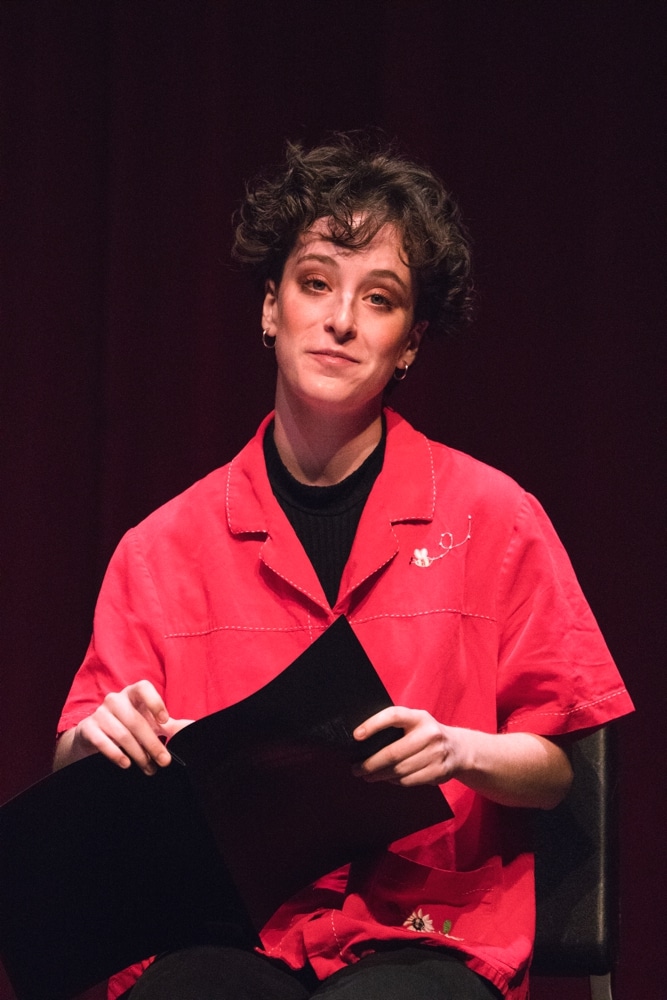
Cast members of “The Untitled Narratives: A Space of Radical Creative Resistance” took center stage at Thorne Hall Feb. 9, performing original and adapted pieces that addressed the experiences of women and femmes under patriarchal violence. Based on playwright and activist Eve Ensler’s original show “The Vagina Monologues,” Occidental cast members renamed the show “The Femme Monologues” in 2017 because the original name limited the show’s content to the biologically female-bodied, according to cast members Ariadne Makridakis (sophomore), Annika Schlesinger (first year), Eleanor Goulden (junior), Darby Pak (junior) and co-presidents Yumi Kobayashi and Juliana Durning (juniors). The first piece of the night this year, “Introduction,” addressed the group’s misuse of the word femme — a historically lesbian identifier — and the consequent name change to “The Untitled Narratives.”

According to Goulden, Ensler’s original show was based on her interviews with other women and their experiences with patriarchy. This year’s cast drew on their own experiences for the performance more so than in previous years, according to Kobayashi. Kobayashi said five out of 18 pieces were adapted from other works while 13 were original pieces. The process of writing original work was powerful but challenging, according to Kobayashi.

“Collaboration is difficult when you’re talking about such complex and fragile subjects,” Kobayashi said.
Durning, Makridakis, Pak and Kobayashi wrote and performed a group piece titled “In-between.” The piece highlighted the experiences of women of color who bear a stigmatized identity in the United States, drawing on Gloria Anzaldúa’s work “Borderlands/La Frontera: The New Mestiza.”
“I’m a Critical Theory and Social Justice major, and a lot of the theory I read inspires my writing,” Makridakis said. “I think of myself as theory in the flesh. I’m a mixed-racial woman of color, so I feel like when I write, it’s theory being bled out on the page.”
Goulden added that an entirely student-written and performed production would be groundbreaking.
“I think it’s more powerful to have words that your classmates are speaking, [as] opposed to these characters who [Ensler] created. I think it would be really cool if [the show] was entirely original,” Goulden said.
Beyond the actual show, cast members found the process of writing, performing and rehearsing to be empowering, resulting in a tight-knit community, according to Makridakis.
“[In creative writing classes] you bring your work and you get critiqued, but this was collaborative. We checked in with each other, what was going on in our personal lives, what was affecting us mentally and emotionally,” Makridakis said.
According to Schlesinger, this production was unlike any of her past experiences in theater.
“I’ve never been involved in a show that was a space for women and for people who’ve experienced patriarchal oppression, one that structured around these issues in writing and performing,” Schlesinger said.
According to Pak, in the process of renaming the show from “The Vagina Monologues” to “The Untitled Narratives,” cast members sought to differentiate between the words narrative and monologue.
“There’s something very performative about the word monologue,” Goulden said. “Monologues seem like a chore that you do to audition with.”
According to Kobayashi, the word monologue was no longer appropriate.
“Ultimately, because we have a good amount of group pieces, the monologue naming no longer fit our show,” Kobayashi said.
Schlesinger explained the misuse of the word femme, a term usually associated with lesbian women, to represent the entire cast and how many members of the cast found the term to be problematic.
“We changed it from ‘The Femme Monologues’ because femme as a term is historically lesbian. It’s been appropriated by straight women,” Schlesinger said.
According to Goulden, the cast tried to think of a title other than “Untitled,” but nothing felt appropriate. Pak agreed.
“When you have such a diverse group [with] different gender identities, sexualities, backgrounds, it’s impossible to find one word to encompass everyone. Right now, [the English] language doesn’t have a word to encompass all of us with equal representation,” Pak said.
Audience member Yuzu Ikeue (junior) was happy with the name change.
“I’m glad they took into account the history of the word femme,” Ikeue said.
According to Kobayashi and Pak, this year’s show served as a transition period for “The Untitled Narratives.”
“It’s recognition that time is changing, language is changing, identity is changing. It’s important for others to know why we changed the name outside of those who watched our show,” Pak said.
Kobayashi’s said her hope is that the conversation around the name continues.
“I think the name will change with time, and who it represents. I think it is ultimately up to the cast next year,” Kobayashi said.
All the proceeds from the tickets were split evenly between the L.A. LGBT Center and the Downtown Women’s Center, according to Kobayashi.
![]()






























